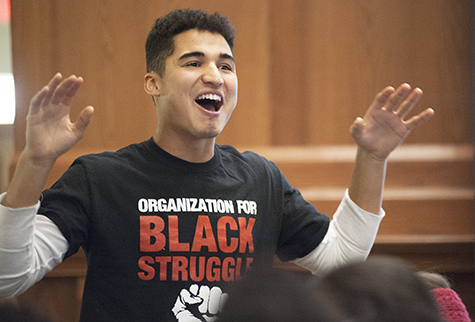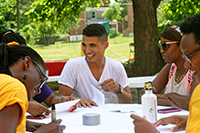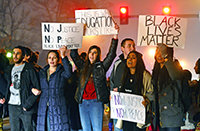
Looking back, Reuben Riggs, a senior in Arts & Sciences at Washington University in St. Louis, now sees how black kids were treated differently at his Nacogdoches, Texas, high school. One clue: he was the first African-American student in three years to be placed in AP English. Another: white students often got by with behavior that landed black friends in detention.
“Because I lived in a nice neighborhood with my mother, who is white and a doctor, I didn’t recognize the racism right in front of me,” Riggs said. “I didn’t pick up on a lot of the ways people misjudged me or misrecognized me.”
Riggs, who is majoring in anthropology and African-American studies, said his studies have awakened him to the racism – structural and implicit – that persists in our world. As has his work for the Organization for Black Struggle in St. Louis’ 22nd Ward, the northside neighborhood decimated by neglect.
So when Riggs learned of the Aug. 9, 2014, shooting death of Michael Brown, he felt compelled to act. He helped form St. Louis Students in Solidarity, a group of concerned college students from across the region; joined protests in St. Louis and Ferguson, Missouri, and organized demonstrations on the Danforth Campus.
“The foundation of so many of our majors is about struggle and the fight for justice,” Riggs said. “To know that and not go out and engage when it’s happening on my doorstep would go against everything I believe in.”

Through his work in previous movements (he participated in rallies against the coal industry and for better wages for fast-food workers), Riggs learned the ins and outs of organizing – travel in groups, bring water, have an attorney and write the number on your arm.
When the grand jury decision in the case surrounding Brown’s death was announced Nov. 24, Riggs advised some 200 student protesters of their legal rights and urged them to get out if protests turned ugly. He also told the students they owe it to society to take a stand.
“Society invests a lot of time and money and energy in us as students,” Riggs told the crowd in Tisch Commons. “It’s because we are an investment in the future and how society is going to look in the future. This is our opportunity as students to use that investment wisely and to make the change in the world that we want to see.”
Still, playing the dual role of college student and protester can be taxing. Riggs has choked on pepper spray and has pushed through many all-nighters to keep up with school work. But perhaps the greatest challenge Riggs has faced has been backlash from his fellow students. Many don’t agree with Riggs’ perspective. Others support the cause, but not the tactics, such as demonstrating in Olin Library and blocking traffic.
“I get it, but I kind of like to eat,” one student was overheard saying during a lunchtime protest in Tisch Commons in December.
“Honestly, the backlash has been surprising and demoralizing,” Riggs said. “But I love this school, I really love it. In any relationship that matters, you fight and call it out and make it a better place. I recognize the immense amount of good Washington University has done for me, and the immense amount of good it has done for so many people. So I’ve brought this fight here because I care about this place.”
Riggs is both an Ervin Scholar and a Cantor Family Civic Scholar. He said those programs have influenced who he is and what he values. He counts 2014 graduates and fellow Ervin Scholars Josh Aiken, a Rhodes Scholar, and Mahroh Jahangiri, a Carnegie Endowment for International Peace Fellow, as role models. (Aiken was also a Civic Scholar.)

“Josh has an amazing way of being very genuine and connecting with people in a lot of different spaces,” Riggs said. “Mahroh is incredibly passionate and fearless.
“I aspire to be the sort of leader who is all of those things,” he said.
He already is, said Jennifer Harpring, director of the Civic Scholars Program and program manager for the Gephardt Institute for Public Service.
“Anger and frustration with the system may be his starting point, but he always strives to act with empathy and compassion towards others, even those who are ideologically opposed to him,” Harpring said. “Those qualities will enable him to develop strategies and build partnerships to solve the bigger problem.
“Something he thinks about a lot is, ‘How do I say what I want to say so that people hear it vs. saying what I want to say just because I want to say it,’” Harpring said.
Riggs also is a great listener, Harpring said. Take, for instance, his work in summer 2014 for the Organization for Black Struggle. Originally, Riggs wanted to talk to residents about the incarceration of black men. They wanted to talk to him about housing.
“Reuben realized that overincarceration of young black men is part of the issue, but not the only conversation in that community,” Harpring said. “He understood, ‘I can’t be the person who says: This is the problem in your community. I have to be the person who listens.’
“It helps that Reuben clearly loves this city,” she said. “He sees St. Louis for all of its complexity and challenges but also for its opportunity and hope.”
Riggs ultimately would like to earn his doctorate in anthropology and become an “academic activist,” someone who, as Riggs put it, “uses the knowledge produced on a university campus for social good, but also looks to the community as a source of knowledge.”
In the meantime, he will continue his work in St. Louis.
“I love St. Louis and think it can change,” Riggs said. “I want to be part of that.”